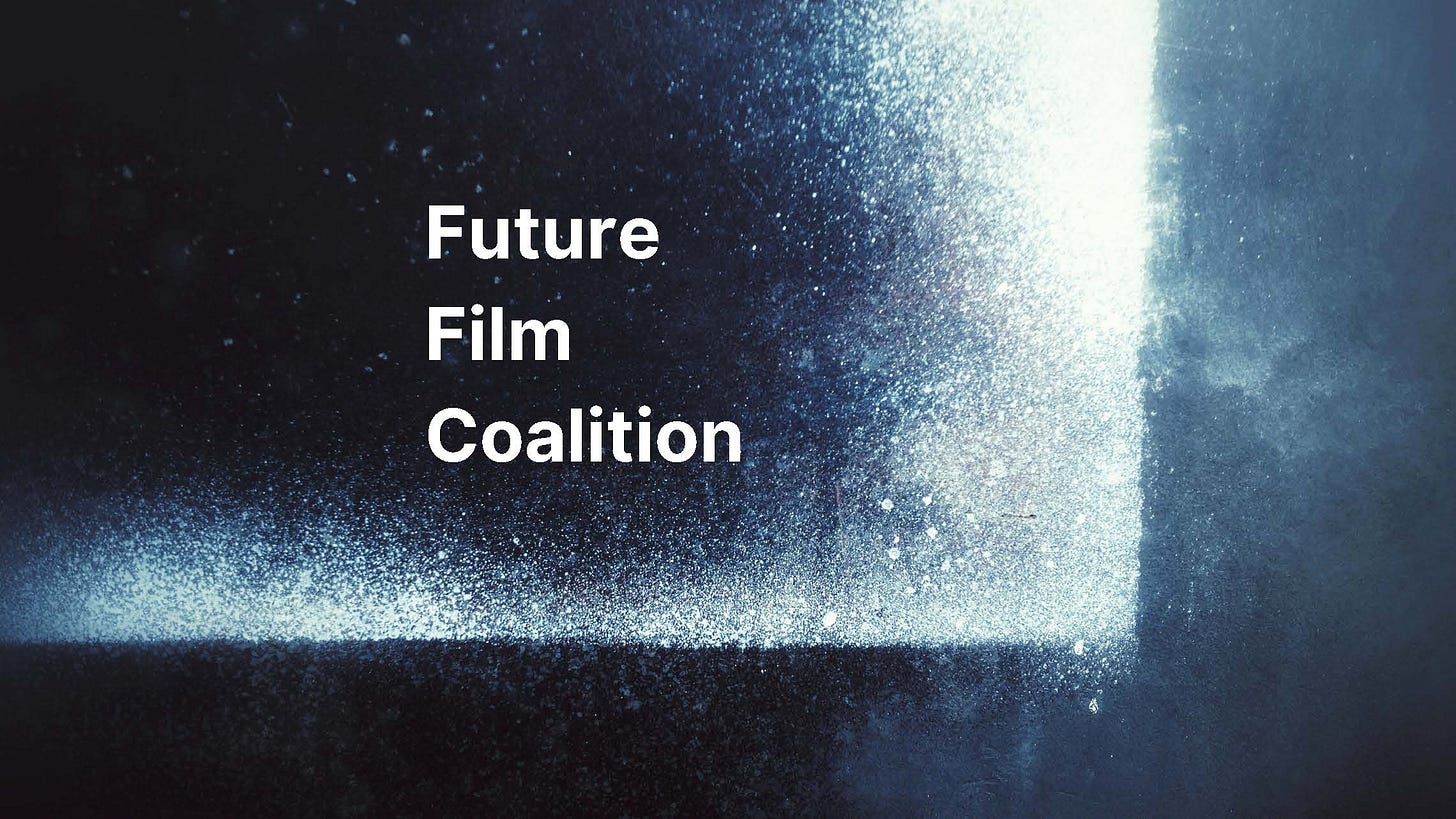Future Film Coalition Town Hall Recap
Today, we cover: the Feb. 27 Town Hall. Look out for our inaugural newsletter later this week.
Town Hall Recap
On Thursday, February 27, 2025, over 700 film industry professionals gathered for our first virtual Zoom town hall to introduce the Future Film Coalition (FFC), demonstrating significant interest from across the independent film community.
Born from discussions among film professionals over the past six months, the coalition aims to build a unified voice across all sectors of independent film. As Sanjay Sharma explained, “The organization is meant to be a support engine to fuel federal and interstate advocacy through research and action planning. The organization is designed to be guided and led by you, the members and the community. That’s why we call it a coalition.”
The FFC's structure will include six branches representing diverse sectors: filmmakers (fiction and documentary), nonprofit support organizations, exhibition, distribution, marketing & publicity, and at-large members (lawyers, agents, etc.). These branches will launch in summer 2025 and form the backbone of the coalition's governance. Branch members will identify key issues, elect representatives to the governing board, and help build community within their sectors.
Research will focus on two primary streams:
Identifying specific policy, regulatory, and public funding interventions that promote a strong independent film sector; and
Bolstering the case for independent film sectors through economic and cultural impact data.
Keri Putnam explained the importance of economic and cultural impact research: “Any successful advocacy movement is going to require that data. And currently, there are several local data reports, there are great case studies available, but there is no nationwide report of field impact.”
Within the policy and regulatory stream, Abby Sun outlined four key research areas:
Public investments: Including public media and national film funding
Anti-competitive practices: Advocacy to curb practices that disadvantage independents
International models: Studying regulations or legislation from other countries
Indie carve-outs: Which can be applied in tax incentives and other policies
We will post more about this research later this week.
Q&A Highlights
Questions centered around several themes including coalition-building strategies, funding mechanisms, diversity and inclusion amid policy rollbacks, potential conflicts between different industry sectors, and how to leverage audience support for advocacy efforts.
On working with labor organizations: “It is absolutely... essential that we are allied with everybody in the trades, including their labor organizations. We don’t see any antagonism or any conflict there.” - Jeffrey Kusama-Hinte
On audience engagement: “There are 75 million people who expressed a definite fan-ship of independent film and media... How do we… activate those people and get them involved?” - Keri Putnam
On diversity and inclusion amid policy rollbacks: “What is happening right now at the federal level may or may not even be legal. So this is an evolving situation... This coalition in every meeting has brought up this issue. This is a core value. We believe the health of the sector is diverse. We will not survive as a sector if we are not actually representing our audiences and our communities. Those in this room who feel like your voice might be marginalized, we’re inviting you into leadership.” - AJ Christian
On international collaboration: “We’re definitely going to involve them in an advisory capacity to help inform what we're doing. Eventually, we want to expand out and become a part of a global conversation... But that’s going to take some additional work.” - Jon Reiss
Upcoming FFC Opportunities
The Future Film Coalition has launched two working groups to advocate for independent film and media in state tax incentives and public funding. The current working groups are focused on:
State Tax Incentives Working Group: This group is focused on advocating for indie film carve-outs in tax incentives, beginning with California. Sanjay Sharma shared during the Town Hall, “We have a lot of research behind it. We’ve drafted letters to get in front of the mayor's office, the governor's office, and key state legislators.” AJ Christian added, “What I've seen outside of LA is the same thing, where when you focus on the local, you actually see the breadth and diversity of partners that can come together through the tax credit.”
Public Media & Funding Working Group: This group is defending against immediate threats to public media and arts funding, focusing on messaging, outreach, and strategy. As Barbara Twist warned, “The landscape for public media and public funding for the arts is incredibly dire right now. Our artistic freedom and freedom of speech is already being restricted. This administration is openly ignoring court orders, and these attacks will not go away."
If you are interested in joining one or both of these working groups, please submit the survey linked below.


